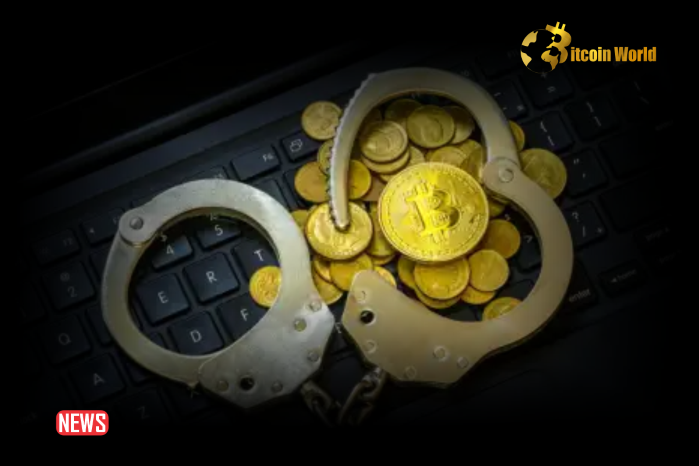In a landmark case highlighting the intensifying crackdown on cryptocurrency-related financial crimes, Anatoly Legkodymov, the founder of the cryptocurrency exchange Bitzlato, has been sentenced. But what does this sentencing really mean, and what are the broader implications for the crypto world? Let’s delve into the details of the case and understand the key takeaways.
Bitzlato Founder Receives 18-Month Sentence: Justice Served or a Slap on the Wrist?
Judge Eric Vitaliano delivered the sentence to Legkodymov: 18 months in prison. Interestingly, this is the exact amount of time Legkodymov had already spent in Brooklyn’s Metropolitan Detention Centre (MDC). Effectively, he was sentenced to time served and released. Why such a sentence for facilitating a staggering $700 million in illicit transactions?
- The Crime: Legkodymov pleaded guilty to operating an unlicensed money-transmitting business. This business allegedly facilitated the laundering of over $700 million linked to illegal gambling and drug trades, primarily stemming from the Russian dark web marketplace Hydra Market.
- The Setting: The harsh conditions at Brooklyn’s MDC, where Legkodymov was detained, were explicitly acknowledged by Judge Vitaliano. He called it a “terrible place,” and confirmed that the court considered these conditions when determining the sentence. This detail draws parallels to another high-profile crypto figure, Sam Bankman-Fried of FTX, who also spent time at MDC before his conviction.
- Financial Repercussions: As part of his plea deal, Legkodymov agreed to forfeit his claims to $23 million in cryptocurrency assets. These assets were seized by French authorities during the international operation that led to Bitzlato’s shutdown in January 2023.
While some might view time served as lenient considering the scale of the money laundering operation, the court’s decision reflects a nuanced understanding of the circumstances. But did Legkodymov truly understand the gravity of his actions?
“I Could Have Done More”: A Founder’s Regret?
In court, Legkodymov expressed remorse, stating, “I realize now, as the founder of the company, I could have done more.” This statement underscores a critical aspect of the case: the responsibility of crypto exchange operators to implement robust anti-money laundering (AML) measures. Prosecutors argued that Bitzlato deliberately failed to monitor its users effectively, allowing it to become a haven for illicit funds.
Evidence presented in court painted a clear picture:
- Bitzlato users openly sought assistance for transactions on Hydra Market.
- Users admitted to trading under false identities, highlighting the lack of proper Know Your Customer (KYC) procedures.
- Internal messages revealed Legkodymov himself acknowledging in 2019 that many Bitzlato users were “known to be crooks.”
These points raise serious questions about the oversight and ethical considerations within the cryptocurrency exchange industry. Was Bitzlato an outlier, or is this indicative of a wider problem?
Is This Sentencing Part of a Larger Crypto Crackdown?
Legkodymov’s arrest in Miami and the subsequent sentencing are not isolated events. They are part of an escalating global effort to regulate and control the flow of illicit funds through cryptocurrency platforms. This operation to shut down Bitzlato was a collaborative effort involving:
- The United States
- Spain
- Portugal
- Cyprus
- Europol
Europol’s findings were particularly damning, reporting that approximately 46% of Bitzlato’s processed assets – a staggering $1.09 billion – were linked to illicit activities. These transactions were connected to a disturbing range of illegal activities, including:
- Entities sanctioned by OFAC
- Cyber scams
- Money laundering
- Ransomware attacks
- Child abuse material
The U.S. Justice Department’s National Cryptocurrency Enforcement Team is at the forefront of this crackdown, signaling a clear message: the crypto industry is not exempt from traditional financial regulations and will be held accountable for facilitating illegal activities. This case, alongside the recent settlement with Binance and its CEO Changpeng Zhao (CZ) for similar AML violations, demonstrates a significant shift in regulatory scrutiny.
What Does This Mean for the Future of Crypto?
The sentencing of Legkodymov and the broader crackdown on Bitzlato serve as a stark warning to the cryptocurrency industry. Key takeaways include:
- Increased Regulatory Scrutiny: Expect intensified pressure from regulatory bodies worldwide to enforce stricter AML and KYC compliance within the crypto space.
- Accountability for Exchanges: Crypto exchanges will be held increasingly responsible for the transactions occurring on their platforms. Simply claiming ignorance of illicit activities will no longer be a viable defense.
- Focus on Compliance: For crypto businesses to thrive long-term, robust compliance frameworks are no longer optional – they are essential for survival and legitimacy.
The Bitzlato case is a clear signal that the era of unchecked growth in the crypto world is coming to an end. As regulations tighten and enforcement actions increase, the industry must adapt and prioritize responsible practices to ensure its future. The message is clear: compliance and ethical operation are no longer just good business practices, they are the price of admission to the mainstream financial world.
Disclaimer: The information provided is not trading advice, Bitcoinworld.co.in holds no liability for any investments made based on the information provided on this page. We strongly recommend independent research and/or consultation with a qualified professional before making any investment decisions.




